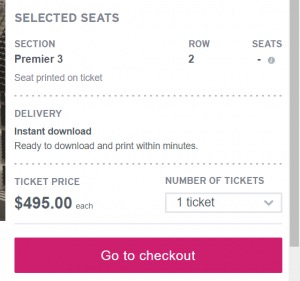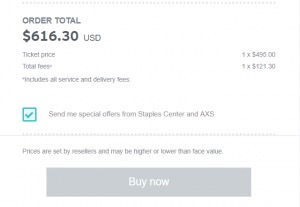By D. John Hendrickson
StubHub’s price disclosure practices have come under scrutiny by the National Advertising Division (“NAD”) of the Council of Better Business Bureaus, and NAD’s decision last month critical of these practices has implications for all online marketers of consumer goods and services.
At issue in the StubHub inquiry was the manner in which StubHub discloses its services fees to customers and whether these disclosures are adequate to properly inform consumers of the total price of the tickets purchased on the site.
Similar to many of its competitors in the online ticket industry, StubHub does not disclose its service fees when a ticket price is first presented in a customer’s search results for an event or when the customer selects a seat. Rather, it discloses the price of the ticket without any service fee attached, as shown here:

It is only on the check-out page, several steps later in the buy-flow process, that disclosure of the service fee is made (with the detailed breakdown being presented in a smaller font):

What’s the big deal? StubHub argued that this is a “prevailing practice” in the industry and that consumers expect to see such disclosures on the check-out page (like taxes and shipping charges). Therefore, StubHub argued, consumers are not misled by the display of a lower price at the point of seat selection because the total order price is disclosed at the point of purchase and before the customer clicks on the “buy now” button.
NAD, however, distinguished the StubHub service fee from taxes or standard shipping fees, because the service fee is not a set fee or percentage of the purchase price but instead can range from 24% to 29% of the cost of the ticket. A charge of this magnitude, it held, is significant and might influence a consumer’s purchase decision.
Consistent with its historical treatment of pricing claims, NAD noted that “[I]f a claim needs to be qualified to prevent it from being misleading, any disclosure should be clear and conspicuous and found within the four corners of the advertising in which the claim appears…If material fees are added to the ticket price at check-out, these fees should be disclosed clearly and conspicuously when the initial price is advertised.” NAD added that, “Disclosures are more likely to be effective if they are provided near the claim that they are qualifying, when the consumer is considering the purchase and not after they decide to buy and click through to check-out.”
The StubHub decision follows on the heels of recent regulatory enforcement at the federal and state level involving such diverse subject matter areas as social media influencers and negative option/continuity marketing programs. All too often disclosures in advertising are addressed as almost an afterthought – in the edit bay in “post” and in a hurry. StubHub should be a reminder that the issue of adequate disclosure should be addressed upfront in the design of the campaign and in the execution of the buy-flow process.
Legal disclaimer: This article is not intended to constitute legal advice or to create an attorney-client relationship. We trust you knew this anyway.